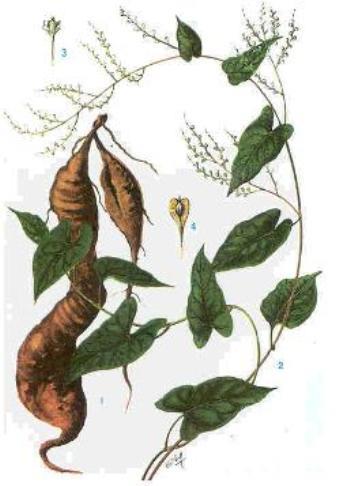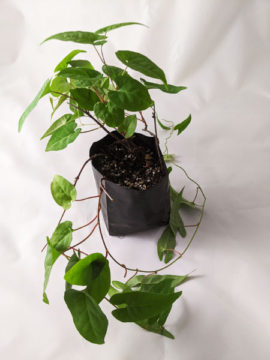FAMILY :: POLYGONACEAE
$200 pesos (small plant from root divisions)
Fallopia multiflora, Reynoutria multiflora, Polygonum multiflorum

 FO-TI, HE SHOU WU, Chinese knotweed: Climbing and sprawling, fast growing vine. Hardy down to at least the mid 20ºs f. and easy to grow in Vallarta. Very important Chinese and Ayurvedic rejuvenative herb. The root tubers are used.
FO-TI, HE SHOU WU, Chinese knotweed: Climbing and sprawling, fast growing vine. Hardy down to at least the mid 20ºs f. and easy to grow in Vallarta. Very important Chinese and Ayurvedic rejuvenative herb. The root tubers are used.
“Fo-ti is also known as Chinese climbing knotweed or “he shou wu,” which means “the black-haired Mr. He.” Its scientific name is Polygonum multiflorum. It’s a climbing plant that’s native to China. It’s also grown in Taiwan and Japan.
Legend has it that famine struck the village of a poor man named Mr. He. While most people left to find food and temporary work, Mr. He was too sick to leave. He gathered and ate wild plants and roots to keep from starving.
One of those was the bitter fo-ti root, which the villagers hadn’t previously eaten. Gradually, Mr. He regained his health. His complexion brightened. He fathered a son. And his graying hair turned black again. He went on to live a long and vital life.
Fo-ti extracts are used in creams and ointments for skin conditions. Shampoos containing the herb are available to help combat hair loss and graying. It’s also brewed into teas and made into pills.
In traditional Chinese medicine (TCM), fo-ti has been used in longevity tonics to ward off aging. It’s also been used to treat a variety of other conditions, such as constipation and skin problems…”
THE LEGEND:
“Long revered as one of the most important and powerful herbs in the Chinese Medicine pharmacopeia, He Shou Wu (Polygonum multiflorum), which is also known as Fo-Ti, has a rich and mystical history that illustrates exactly why it grew to such stature and fame and hints at some of its more exotic—and highly sought after—benefits and effects. It was recorded in ancient Daoist texts that Fo-Ti was discovered around 812 AD, when a frail, weak, sterile old man who had fallen asleep in the forest after a night of heavy drinking awoke next to an exceptionally long He Shou Wu vine.
Something about the plant struck him as unusual and so he proceeded to dig up its roots (a common practice in China at the time) to take home for further investigation. Upon inquiring in his village about the nature and properties of the plant to no avail, a local hermit suggested he ingest it to discover the effects for himself. Adventurous as he was, he prepared the He Shou Wu roots according to Daoist herbal principles and began consuming it regularly. Within a week, he became quite virile and managed to father a child a few months later after decades of impotency and sterility, which was a miracle in itself. He continued to take Fo-Ti everyday and his strength and vitality returned despite his old age. Eventually, his hair color returned, almost magically shifting from gray to a rich, lustrous black. Over the years that followed, he went on to father at least five more children and lived well into his hundreds, with some sources recording his final age as 160 years old. The man’s name was He Tianer, for which the herb was named He Shou Wu, meaning “He’s Black Hair,” alluding to its incredible origin story.”